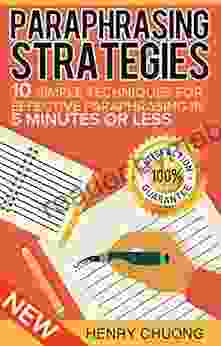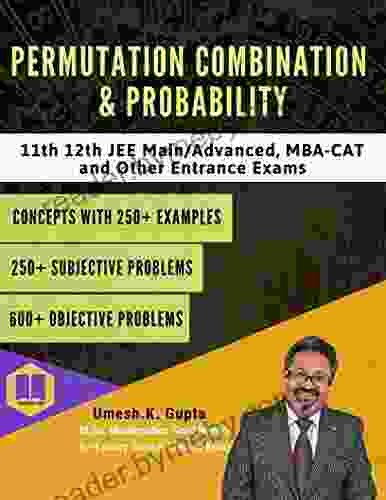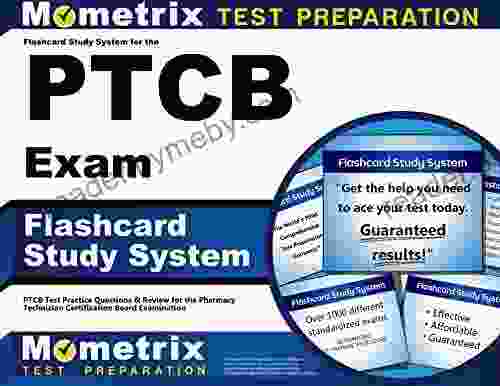10 Simple Techniques For Effective Paraphrasing In Minutes Or Less

Paraphrasing is a valuable skill that can help you improve your writing, communication, and critical thinking skills. It involves expressing someone else's ideas or thoughts in your own words while maintaining the original meaning.
4 out of 5
| Language | : | English |
| File size | : | 1284 KB |
| Text-to-Speech | : | Enabled |
| Screen Reader | : | Supported |
| Enhanced typesetting | : | Enabled |
| Word Wise | : | Enabled |
| Print length | : | 59 pages |
| Lending | : | Enabled |
Effective paraphrasing is not simply replacing a few words with synonyms. It requires understanding the original text and then expressing it in a way that is both accurate and clear.
The following 10 techniques can help you paraphrase effectively in minutes or less:
1. Read the original text carefully
Before you start paraphrasing, it is important to read the original text carefully to make sure that you understand it. This means paying attention to the main ideas, the supporting details, and the overall structure of the text.
2. Identify the key points
Once you have a good understanding of the original text, you need to identify the key points. These are the most important ideas that the author is trying to convey. You can usually find the key points by looking at the beginning and end of the text, as well as the topic sentences of each paragraph.
3. Restate the key points in your own words
Once you have identified the key points, you need to restate them in your own words. This means using different words and phrases to express the same ideas. Be careful not to simply replace a few words with synonyms, as this will not create an effective paraphrase.
4. Use different sentence structures
In addition to using different words and phrases, you can also use different sentence structures to create an effective paraphrase. This will help to make your paraphrase more interesting and engaging to read.
5. Avoid plagiarism
When you paraphrase, it is important to avoid plagiarism. This means that you should not copy the original text word-for-word. Instead, you should use your own words and phrases to express the same ideas.
6. Cite the original source
If you are using someone else's ideas in your paraphrase, it is important to cite the original source. This will help to give credit to the original author and avoid plagiarism.
7. Practice regularly
The best way to improve your paraphrasing skills is to practice regularly. Try paraphrasing articles, speeches, and other texts that you read. The more you practice, the easier it will become.
8. Get feedback
Once you have written a paraphrase, it is helpful to get feedback from others. This can help you to identify any areas that need improvement.
9. Use paraphrasing tools
There are a number of paraphrasing tools available online. These tools can help you to quickly and easily paraphrase text. However, it is important to use these tools with caution, as they can sometimes produce inaccurate or awkward paraphrases.
10. Be patient
Paraphrasing can take time and effort. Don't be discouraged if you don't get it right the first time. Just keep practicing and you will eventually become a proficient paraphraser.
Following these 10 techniques can help you to paraphrase effectively in minutes or less. With practice, you will be able to use this valuable skill to improve your writing, communication, and critical thinking skills.
4 out of 5
| Language | : | English |
| File size | : | 1284 KB |
| Text-to-Speech | : | Enabled |
| Screen Reader | : | Supported |
| Enhanced typesetting | : | Enabled |
| Word Wise | : | Enabled |
| Print length | : | 59 pages |
| Lending | : | Enabled |
Do you want to contribute by writing guest posts on this blog?
Please contact us and send us a resume of previous articles that you have written.
 Book
Book Novel
Novel Page
Page Chapter
Chapter Text
Text Story
Story Genre
Genre Reader
Reader Library
Library Paperback
Paperback E-book
E-book Magazine
Magazine Newspaper
Newspaper Paragraph
Paragraph Sentence
Sentence Bookmark
Bookmark Shelf
Shelf Glossary
Glossary Bibliography
Bibliography Foreword
Foreword Preface
Preface Synopsis
Synopsis Annotation
Annotation Footnote
Footnote Manuscript
Manuscript Scroll
Scroll Codex
Codex Tome
Tome Bestseller
Bestseller Classics
Classics Library card
Library card Narrative
Narrative Biography
Biography Autobiography
Autobiography Memoir
Memoir Reference
Reference Encyclopedia
Encyclopedia Lorraine Mccamley
Lorraine Mccamley Nathan Holder
Nathan Holder Lee Craker
Lee Craker Sally Mann
Sally Mann Sydney Brake
Sydney Brake Robert Collins
Robert Collins Morgan Rice
Morgan Rice Phoebe Damrosch
Phoebe Damrosch Sharone Stevenson
Sharone Stevenson Neil Bimbeau
Neil Bimbeau Oluwatosin E Adeyemo
Oluwatosin E Adeyemo Wayne Webster
Wayne Webster Ryan Holiday
Ryan Holiday L C Blackwell
L C Blackwell Steven Satterfield
Steven Satterfield Stephanie Kaplan Lewis
Stephanie Kaplan Lewis Veda Austin
Veda Austin Robert Rodriguez
Robert Rodriguez Martin W Bowman
Martin W Bowman Robin Green
Robin Green
Light bulbAdvertise smarter! Our strategic ad space ensures maximum exposure. Reserve your spot today!

 Bobby HowardPraxis Core Prep Test Vocabulary Word Roots Flash Cards: Cram Now for Praxis...
Bobby HowardPraxis Core Prep Test Vocabulary Word Roots Flash Cards: Cram Now for Praxis... Ernest HemingwayFollow ·5.1k
Ernest HemingwayFollow ·5.1k Galen PowellFollow ·16.4k
Galen PowellFollow ·16.4k John GreenFollow ·4.1k
John GreenFollow ·4.1k Ken SimmonsFollow ·9.6k
Ken SimmonsFollow ·9.6k Greg FosterFollow ·2.8k
Greg FosterFollow ·2.8k Billy PetersonFollow ·2.1k
Billy PetersonFollow ·2.1k Ricky BellFollow ·5.4k
Ricky BellFollow ·5.4k Chadwick PowellFollow ·6.5k
Chadwick PowellFollow ·6.5k
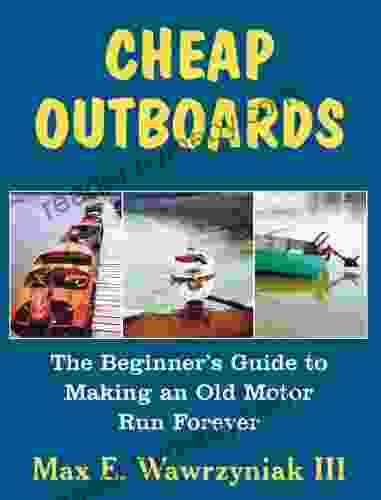
 Wayne Carter
Wayne CarterThe Beginner's Guide to Making an Old Motor Run Forever
If you're like most...
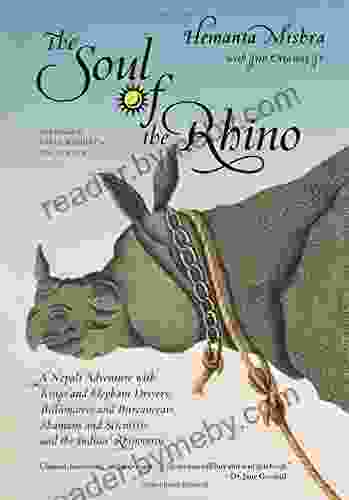
 Deacon Bell
Deacon BellNepali Adventure: Kings and Elephant Drivers,...
In the heart of the...
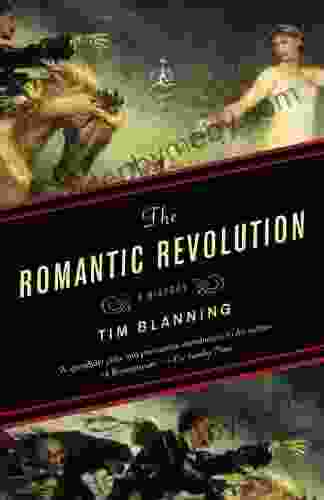
 Carlos Drummond
Carlos DrummondThe Romantic Revolution: A Journey Through History and...
Unveiling the...

 Kazuo Ishiguro
Kazuo IshiguroUnlock Your Inner Innovator: Dive into the New Wave...
Embark on a Transformative Journey of...
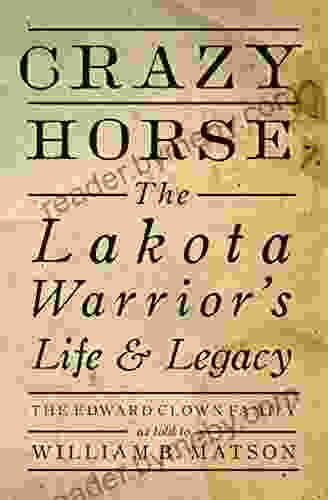
 William Golding
William GoldingCrazy Horse: The Lakota Warrior's Life and Legacy
In the annals of Native...

 Hector Blair
Hector BlairMildred and Richard Loving: The Inspiring Story of...
Mildred and Richard Loving were an...
4 out of 5
| Language | : | English |
| File size | : | 1284 KB |
| Text-to-Speech | : | Enabled |
| Screen Reader | : | Supported |
| Enhanced typesetting | : | Enabled |
| Word Wise | : | Enabled |
| Print length | : | 59 pages |
| Lending | : | Enabled |


